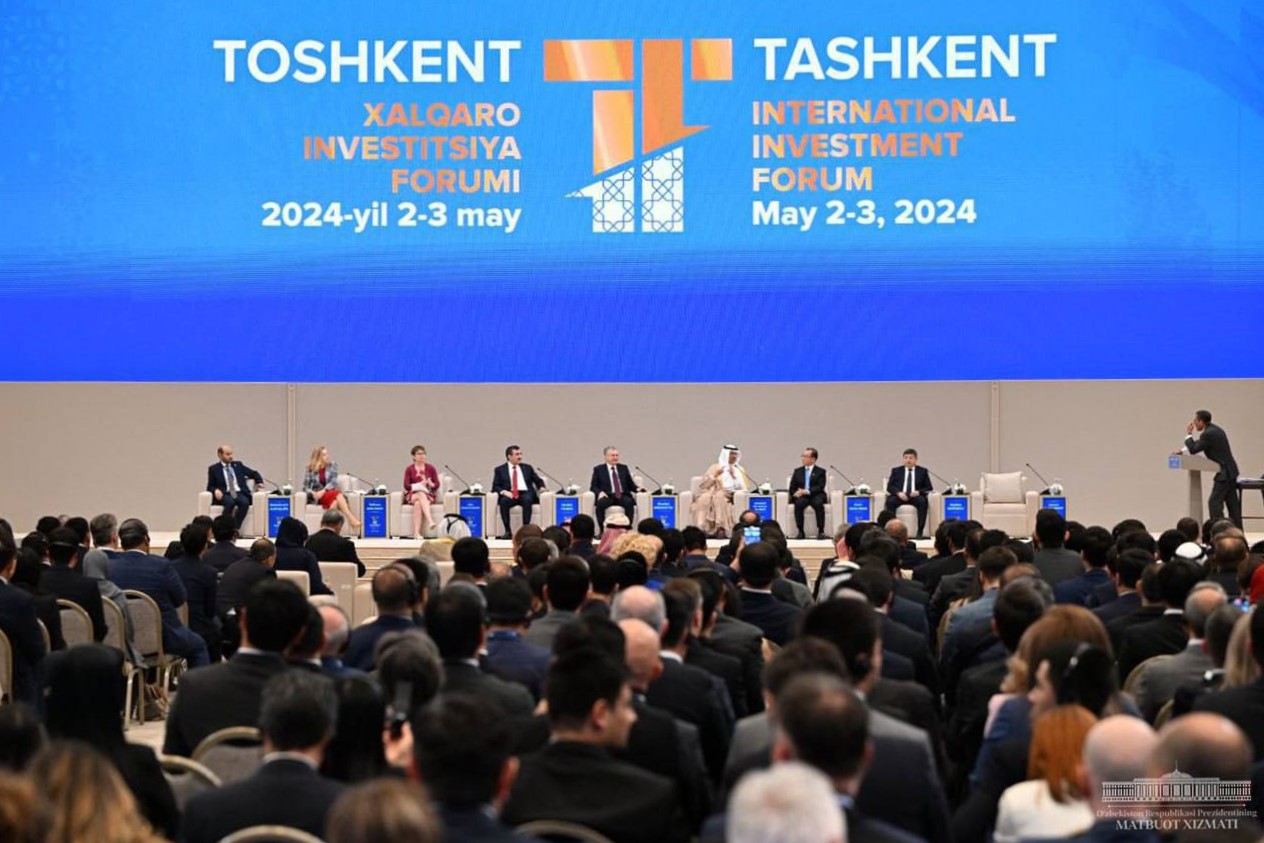This past week, the media paid attention to the Tashkent International Investment Forum (TIIF) held on May 2-3 in Uzbekistan's capital city, the collective ban on the export of sugar from the Eurasian Economic Union, the announcement of the launch of the China-Kyrgyzstan-Uzbekistan railway in October, Almaty's hosting of Foreign Ministers of Azerbaijan and Armenia for peace talks, the aftermath of the spring floods in Kazakhstan, and the catastrophic floods in the northern and western regions of Afghanistan.

The 3rd Tashkent International Investment Forum (TIIF) was held at the Tashkent City Congress Hall on 2 and 3 May. Source: TIIF
Investment
The third International Investment Forum (TIIF) in Tashkent, held on May 2-3, 2024, gathered over 2,500 participants from 93 countries and led to the signing of significant investment contracts totaling US$ 26.6 billion (Uzbekistan’s Ministry of Investment & Trade). Among the notable agreements reached, Saudi company Data Volt will construct urban infrastructure in “New Tashkent” valued at US$ 1 billion and develop a green technology-based data center worth US$ 3 billion. Acwa Power is undertaking projects to build a 5 GW wind farm in Karakalpakstan and establish 2 GW of energy storage devices, totaling $6.2 billion. Additionally, UAE-based Amea Power will construct a 1000 MW wind power plant in Karakalpakstan valued at US$ 1.1 billion. Saudi Tabrid company will modernize the heat supply system in Nukus, Fergana, and Kuvasay for US$ 750 million. Nile Sugar company from Egypt will cultivate sugar beets and produce sugar in the Jizzakh region with an investment of US$ 500 million. Chinese company Shanghai Knud International is implementing a project for textile and clothing production in the Namangan region worth US$ 205 million, and Wilmar International from Singapore will produce food products and confectionery in the Tashkent region with a project value of US$ 200 million (Sputnik Uzbekistan).
Trade
Earlier in the month, the Russian Federation introduced a ban on sugar exports until August 31, and Kazakhstan followed suit on May 6 (Orda). Kazakhstan intends to engage in negotiations with Russia to potentially increase the quota for Russian sugar exports by an additional 100,000 tons by year's end. Similarly, Kyrgyzstan announced on May 10 its decision to halt sugar exports until the end of August (Kaktus). Officials from Kyrgyzstan’s Ministry of Agriculture, Food Industry, and Land Reclamation clarified that the ban does not affect exports to other members of the Eurasian Economic Union but is specifically targeted at destinations outside the EaEU.
Regional Connectivity
President Sadyr Japarov of the Kyrgyz Republic officially announced plans to commence construction of the China-Kyrgyzstan-Uzbekistan railway in October of this year (24.kg). This railway project holds immense significance for the landlocked country, as it will establish a crucial transport link to China and Uzbekistan, consequently connecting Kyrgyzstan to Russia, Turkmenistan, the Caspian Sea, and the broader region. Deputy Minister of Transport of Uzbekistan, Zhasurbek Choriev, previously stated at TIIF that the railway will span 454 kilometers, with both Uzbekistan and China providing assistance in the development process (Gazeta Uzbekistan).
Conflict Resolution
At the invitation of Kazakhstan’s Ministry of Foreign Affairs, the Foreign Ministers of Azerbaijan and Armenia arrived in Almaty for a round of peace talks that began on May 10 (Kaz Inform). Kazakhstan has a history of successful international mediation, notably during the Astana Format talks, and its tradition of multi-vector foreign policy likely contributed to both Azerbaijani and Armenian sides accepting the invitation. While it is too early to assess the outcome of these negotiations, both foreign ministers issued identical press statements on May 11, welcoming progress on border delimitation and expressing gratitude to the Kazakh government for initiating these talks (Forbes).
Climate Emergency
Following weeks of heavy rain and flooding in 10 regions of Kazakhstan, which resulted in the evacuation of tens of thousands of citizens, it was reported on Friday that 55,000 Kazakhstanis have been able to leave temporary shelters and return home (Zakon). Emergency services continue to pump out floodwater and disinfect residential areas in the Northwestern regions. While a comprehensive assessment of the total damage is still ongoing, one-time assistance totaling 5 billion Tenge (US$ 11.5 million) has been distributed to 15,000 families, and guaranteed housing will be provided to those who have lost their homes, at least until October (24.kz).
As extreme weather effects continue to hit many regions around the world, heavy rains set off flash floods in the provinces of Baghlan and Badakhshan in the north and Herat and Ghor in the west of Afghanistan throughout the week. At least 50 people are reported to have lost their lives in Baghlan alone (Tolo News), while the UN's International Organization for Migration (IOM) has confirmed an overall death toll of at least 200 (CGTN). Many villages are said to have been cut off from the outside world and are only accessible with helicopters, while persistent rain and flooding have significantly hindered relief efforts (Asriran).

